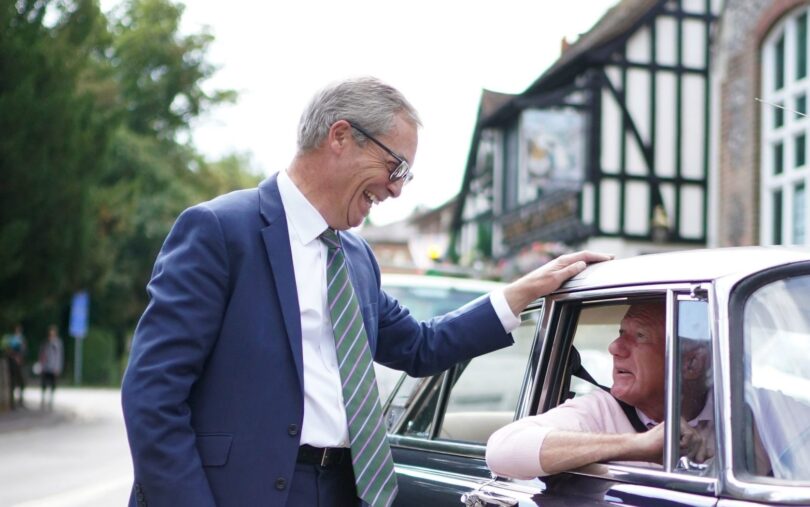Nigel Farage
Dame Alison Rose’s resignation was inevitable. Having broken the first rule of banking by breaching client confidentiality, she had to go. Now the rest of the NatWest Board must follow. Under the Chairmanship (or should I say chairpersonship) of Sir Howard Davies, they endorsed Rose’s behaviour by backing her.
An emergency root and branch examination of what has happened at NatWest under Rose’s leadership must now take place. In recent years this bank – 39 per cent owned by taxpayers, remember – has morphed into a woke warrior. It has become obsessed with public displays of political correctness rather than focussing on the business of managing and making money. The truth is that in its quest to promote diversity and inclusion, this corporate giant has turned into a divisive and poisonous monster. Now it seems that other British banks are also marching down this one-way street. They do it in part to deflect customers’ attention from the fact that they exist to make vast profits. They want people to think they are nicey-nicey but they know this isn’t how corporate life in a capitalist society really works. Banks can be a force for good, but not by discriminating against people with whom they happen to disagree.
I hope that this week marks a turning point. The City Minister, Andrew Griffith, has read the riot act to the 19 bank bosses who were summoned to the Treasury for a meeting. This is a good start. People’s lawfully held political and personal opinions should have nothing to do with their right to a bank account. Banks should not be and must never become political organisations. Any bank that treats a single customer in the way that Coutts acted towards me must have its licence revoked. This point also marks the start of a much bigger campaign for me. As I have said before, the only reason I decided to go public – and ultimately cause myself quite a fair degree of embarrassment – is that I realised over the last couple of years that many people had wrongly had their bank account closed. Since I told my own story this month, I have been inundated with tales from others in genuine distress who have also suffered the indignity of being “de-banked”. I have encouraged all of them to make a Subject Access Request to establish why this happened.
Sadly, a bank account being closed at short notice has made it almost impossible for many people to get a new account opened in time. Some people have been ruined as a result. This is especially true of small business owners who take cash payments, whether they run a local window cleaning firm or a pawn broker. Not having a bank account in the 21st century makes it almost impossible to function. Any bank employee who has allowed such a state of affairs to exist should have this on their conscience. British taxpayers bailed out the banks after the greed and stupidity of executives crashed the system 15 years ago. In return, these same banks have closed hundreds of branches around the country in order to swell their profits, ruined the lives of many by “de-banking” them, and embarked on a holier-than-thou greenwashing exercise as a way of hoodwinking the public into thinking they are caring and responsible. Bluntly, the banks have spat in the faces of the people who should matter most to them, their clients. Now it is time to fight back. A common feeling that has been expressed to me over these past few weeks is one of helplessness bordering on despair. It is clear that nobody has been speaking up for everyday people. Now, I intend to be their voice and to campaign for the cultural and legal changes that our banking system needs. Every law-abiding citizen in this country should have the right to a bank account. The resignation of Dame Alison Rose is the first step to ensuring this can happen. Banks must return to operating as they used to do. Then – and only then – can we return to business as usual.
I am now seriously motivated by this issue. The desperation of those that have been wronged by the big banks means that I simply have to do something. I may not have picked this fight, but I now find myself right in the middle of it. I will be launching, over the course of the next few days, an exercise designed to gather together all of those that have been de-banked. I’m hoping to build a very large database of cases to find out which banks are the worst offenders and what the commonest reasons are, so that we can prepare and present a lobby to ministers, and to Parliament, in order to achieve fundamental change. It might be said that the cultural problem within our banks has, so far at least, only affected a small proportion of the population. But if these institutions continue to believe they can become moral arbiters, monitoring the social media profiles of account holders, the numbers affected will quickly grow.
Our current rulebook, backed up by aggressive compliance departments, has proved to be a sledgehammer that has missed the nut. It isn’t money launderers but innocent people who are paying the price. It simply cannot continue. I will be asking people out there to come and join me. Let’s fight this.
The Telegraph







